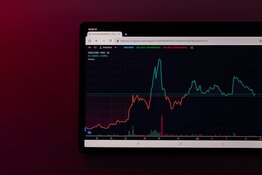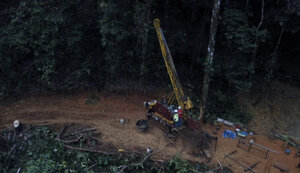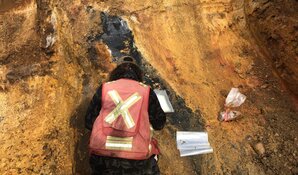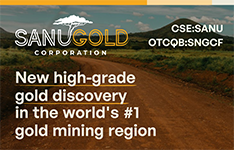The Gold Report: Gold recently witnessed some upside price support after the Cypriot parliament proposed taking money from private bank accounts to raise the €5.8 billion needed to qualify for an international bailout. What was your first reaction to that news?
Jeb Handwerger: Any confiscation of bank accounts would just highlight what I have been saying for a long time—savers are losing money in their banks. Bank deposits are supposed to be a safe haven. Investors are going to seek out alternative hedges against the deterioration of currency and financial repression worldwide. This isn't just happening in Cyprus, but all over the world where there are citizens losing money in their banks and are experiencing negative real rates. Investors need to look for the assets that will protect and grow their wealth in case public policies continue to destroy wealth and savings.
TGR: How does this differ from what happened in Greece?
JH: This takes bailouts to a new level. The debt crisis still continues. The Swiss said they are devaluing the franc to keep pace with the euro. The Japanese are printing yen like crazy. Savings are already being stolen to bail out the banks. It has happened in the U.S. since 2008.
"Precious metals are ripe to breakout."
Precious metals are ripe to breakout. This is the environment where investors can get in ahead of the storms. We're seeing little waves, but they'll build up. It's like a coiling spring. There could be a breakout, panic move into precious metals and the mining equities as investors rotate from the overbought equity market into the undervalued precious metals and the even cheaper gold and silver miners.
TGR: If that is the case, why didn't we see a bigger run on gold when the news of Cyprus broke?
JH: In Cyprus there is panic because it tried to confiscate money outright, but the U.S. and Europe have been subtler about it.
What's going on with precious metals is also hidden. Right now, precious metals are out of favor and mining equities are oversold. Investors believe dividend-paying stocks are a safe haven.
This also happened in the 1990s before precious metals and mining stocks broke out. They pushed the dividend stocks up to a premium, and dividends became smaller and smaller. Eventually, investors realized that dividends weren't such a safe haven because they weren't able to beat inflation.
From 2000 to 2007, there was a massive move into the mining equities and commodities that was set up in the 1990s when dividend stocks were a craze.
Capital will eventually seek out the traditional safe havens, which are precious metals and mining equities, as it has done in the past. Because this sector has been hit hard in 2011–2013, the subsequent rally should be quite impressive.
TGR: Can other citizens of the world expect treatment similar to Cyprus when their governments are short on cash?
JH: They should not only expect it—they're experiencing it right now. Inflation is greater than what governments are saving. There's disruption of capital and wealth as we speak in many countries, including the U.S., most of Europe, Japan and in the Swiss franc. It might not be front and center, but people better start wising up to it and preparing themselves. Once the public realizes this, once inflation starts rearing its ugly head, it will be too late to get in.
"Capital will eventually seek out the traditional safe havens, which are precious metals and mining equities, as it has done in the past."
To paraphrase Gerald Loeb, who wrote "The Battle for Investment Survival," the worst way to fight inflation is to buy assets at an inflated price. Mine equities are at historic discounted valuations compared to the overall equity markets. The long-term trend for inflation is that it will move higher. This is a significant discount for investors who want to prepare and be hedged against inflation with assets that are trading at deflated prices.
TRG: Is the euro doomed?
JH: What currency isn't? What currency will still be in use in several hundred years? None. The only thing that lasts is gold, silver and precious metals.
TGR: The S&P/TSX Global Gold Index has lost about one-third of its value in the past two years. Things are far from rosy.
JH: Investors must realize that a poor performer last year might be the best performer this year. I believe gold is undervalued. It could definitely breakout this year and going into 2014.
TGR: In a recent commentary on GoldStockTrades.com you wrote, "Stick to the long term and don't get shaken out of core positions as the smart money will turn around and buy these junior assets graciously from you." I think everyone wants to believe that, but give us a reason why we should.
JH: Major billionaires are taking positions. Billionaire Carlos Slim recently bought AuRico Gold Inc.'s (AUQ:TSX; AUQ:NYSE) gold assets in Mexico; John Paulson has large gold holdings. The smart money has a long-term approach and understands how to protect wealth by buying undervalued assets that have the ability to provide leverage to a rising gold price and inflation. The smart money is positioning and protecting itself ahead of the storm.
TGR: The smart money is looking to undervalued junior miners that should survive this downturn?
JH: Investors don't think that the junior mining companies are going to survive. But they can pick up assets and create value during these difficult economic times if they start paying attention to the companies that can actually grow. Investors have already thrown out some advanced assets, some that are already permitted—that's worth a lot! Yet investors have this attitude that the junior miners are going to go bankrupt. Some of these companies are priced at liquidation levels, but are quality assets, with good management teams in friendly jurisdictions. With strong shareholder support, they are going to survive. They are going to retain value.
TGR: Juniors need cash to survive. What's the minimum they need to survive the limited financing environment that exists right now?
JH: It depends on the company and the burn rate. Every asset is different. If a company doesn't have cash, is its asset worth something? It could be a candidate for an acquisition. There's very limited downside risk if there's an asset or cash backing the company. The investor just has to hold on and wait until the markets turn.
TRG: Let's talk about some of those companies. What companies fit those criteria?
JH: International Tower Hill Mines Ltd. (ITH:TSX; THM:NYSE.MKT) has a dream team of miners and executives. A vice president helped build the Fort Knox mine, which has been a huge moneymaker for Kinross Gold Corp. (KGC:NYSE) for years in Alaska. The company is progressing the Livengood gold deposit, a very large deposit of more than 20 million ounces (20 Moz) located in a mining-friendly area near Fairbanks, Alaska, to bankable feasibility this year.
"The importance of patience in the mining sector is more important now than ever."
These are the types of assets that can produce more than 500,000 ounces (500 Koz) gold and provide impressive leverage, profits and earnings for investors. That's especially true if the gold price rises, which we think will happen later in 2013.
TGR: Other promising gold projects in Alaska have faced some opposition. Does this project have to overcome that hurdle?
JH: It's in a mining-friendly area near the Fort Knox mine. It has personnel experienced in Alaska who have permitted the Pogo and other major mines. Infrastructure is also very accessible. It's off the highway, the Trans-Alaska Pipeline System is nearby and the topography is relatively flat. If there were a checklist of attributes for the next major gold producing deposit in Alaska, International Tower would have all the boxes checked.
TGR: Is there another company that you're interested in?
JH: Pilot Gold Inc. (PLG:TSX) is well cashed up. I am particularly excited about the company's work at Kinsley Mountain where it is partnered with Nevada Sunrise Gold Corp. (NEV:TSX.V). The companies are exploring the Kinsley Mountain deposit in Nevada, which is a very exciting discovery south of the Long Canyon property. It looks as if there's some potential for Kinsley Mountain to be the next major Nevada discovery, similar to Long Canyon.
I also like Comstock Mining Inc. (LODE:NYSE.MKT), which is a new Nevada producer that is expected to mine 20 Koz gold this year. Very few miners have the cash flow from production to sustain low-cost growth. Comstock Mining may have that ability to continue to grow resources at a low cost with cash flow from producing properties.
TGR: The Pilot Gold project that's getting the most attention right now is TV Tower in Turkey. The company just finished its first drill program on the KCD zone. It seems to be yielding consistent, solid grades in continuity.
JH: Pilot is having a lot of success in Turkey. On top of that success, I believe it will also advance its Nevada Kinsley Mountain project as well. TV Tower has been the main driver, but I keep a close eye on Kinsley Mountain because I like Nevada Sunrise and the Pilot technical team there.
TGR: What else should investors be paying attention to in the gold space?
JH: We really like Nevada and the Cortez Trend, where Barrick Gold Corp. (ABX:TSX; ABX:NYSE) has made a huge discovery at its Goldstrike deposit. Miranda Gold Corp. (MAD:TSX.V) and NuLegacy Gold Corp. (NUG:TSX.V) are right next to Barrick's discovery. NuLegacy is working with Renaissance Gold Inc. (REN:TSX.V) on the Wood Hills project, which is near the Long Canyon discovery.
TGR: Not many people have heard of NuLegacy. What's the narrative there?
JH: Dr. Roger Steininger, the chief operating officer of NuLegacy, has more than 40 years of experience exploring Nevada. He's credited with the 21 Moz Barrick Pipeline mine in the Cortez Trend. NuLegacy has a partnership with Barrick to explore Red Hill in one of the most exciting areas in the Cortez Trend.
There's been more than 52 Moz gold discovered in the Cortez. Barrick's major property, Goldrush, has expanded from 2 Moz to 14 Moz in four years. People are concerned, "Oh, will NuLegacy be able to raise capital?" Being partnered with Barrick and being next door to Goldrush on the Cortez Trend could be very attractive in an environment where Barrick is desperately looking for resource growth in a mining-friendly jurisdiction and speculation returns to the junior market.
TGR: Are there any companies that have cash?
JH: Miranda Gold raised $5 million ($5M) late last year because it was astute enough to realize that financial markets would be tough. It has more than $8M in the bank. With its experienced geological team, it could gobble up undervalued and financially strapped miners with assets. Miranda just signed a strategic alliance with Eagle Nickel Ltd. (ENL:ASX) to explore Colombia that has been completely ignored by the marketplace.
TGR: What others in Nevada are you following?
JH: Keep a close eye on Paramount Gold and Silver Corp. (PZG:NYSE.MKT; PZG:TSX). It is really undervalued and a takeover target. Paramount owns the Sleeper project in Nevada. The company announced a positive preliminary economic assessment (PEA) in July 2012 on Sleeper and it could be a major gold and silver producer in Nevada.
Also look at Paramount's San Miguel project in Mexico surrounding Coeur d'Alene Mines Corp.'s (CDM:TSX; CDE:NYSE) Palmarejo mine. This area is hot with six new operating mines. The Palmarejo district in Mexico is gaining a lot of investor interest especially after the recent $750M acquisition of AuRico Gold Inc. by billionaire Carlos Slim.
Paramount recently released an excellent PEA on its San Miguel project, which showed impressive economics with relatively low startup costs. Because of the overall weak market, the PEA on San Miguel was ignored by investors. Paramount just announced a warrant exercise of over $8M, which should help 2013 programs to advance these projects. This company has a strong shareholder base and the financing to survive this downturn.
TGR: Are there others outside of Nevada that you're following?
JH: Edgewater Exploration Ltd. (EDW:TSX.V) has operations in Spain. This has been a very significant year for Edgewater as the company advances the Corcoesto gold project in Spain. Its environmental impact statement was approved last year by the Spanish government. One of the reasons it is receiving so much support with permitting from the government is that the local regions are dealing with high unemployment. This could have major economic benefits for the region.
The first half of 2013 could be very significant for Edgewater as it moves closer to publishing its bankable feasibility study. It is also preparing an updated resource estimate and continues to show in-fill drilling results with higher than expected grades and longer widths.
There are very few advanced and permitted junior miners trading at a discount valuation at the bankable feasibility stage.
TGR: A November 2011 PEA on Corcoesto indicated a pre-tax internal rate of return of 34%, with a payback of about two and a half years. Do you expect the feasibility study numbers to be more or less than that?
JH: There's always a margin for error between feasibility and PEA, but it has some very strong backing and an excellent technical team led by COO John Thomas. Edgewater also has some great financiers involved and have been able to raise capital in an extremely tight market. This testifies to the quality of the management team and project. The company has already had some tentative financial agreements with some of the banks that have been looking at it. Once it has that feasibility study and the permit, it should be on its way to production.
TGR: You were at the Prospectors and Developers Association of Canada (PDAC) conference recently and discussed platinum at length.
JH: Unlike gold, platinum is consumed in the auto industry and in other industrial applications for its properties as a catalyst. Platinum is trading at a significant discount to gold. Historically, platinum trades double to gold. It is three times rarer than gold and its supply is very unstable—more than 90% comes from South Africa, Zimbabwe and Russia. There's been talk of resource nationalism in Zimbabwe. There's going to be a search for new supply in stable political jurisdictions.
A platinum company I've been watching is Prophecy Platinum Corp. (NKL:TSX.V; PNIKF:OTCPK; P94P:FSE), which is developing the Wellgreen deposit in the Yukon. The company could be a potential supplier of platinum group metals (PGM) to North America.
TGR: Prophecy has been raising cash for a prefeasibility study. Was that accomplished?
JH: It is still in the process of completing that. However, there's been an increased financial interest in the PGM space. Platinum miner Platinum Group Metals Ltd. (PTM:TSX; PLG:NYSE.MKT) recently raised more than $180M. Institutions are looking to invest capital into this space.
Prophecy has a proven management team that has raised hundreds of millions of dollars during difficult junior markets. The company's recent impressive exploration success should create increased interest.
TGR: Because most PGM mines are in risky jurisdictions, how much of an advantage is it to be in the Yukon?
JH: It is very important. The Yukon government is supportive of mining, there's infrastructure there, and there's no geopolitical fears.
Prophecy's deposits are world class, one of the top five in the world. Very few companies have these sorts of advanced deposits. Prophecy has a triple discount: The company is trading at a significant discount to platinun, platinum is trading at a significant discount to gold and platinum miners are trading at a significant discount to platinum. Every action has an approximate equal and opposite reaction. When the space starts heating up and capital starts flowing into this market, the platinum sector can have a very powerful turnaround and should regain its premium to gold.
TGR: Why hasn't this story received more attention?
JH: Prophecy has a new management team, the platinum price has been underperforming, it's not as popular an area and this sort of environment is just beginning. Investors are just beginning to realize the fragile supply and demand here.
Prophecy has a new chief executive officer, Greg Johnson, who founded NOVAGOLD (NG:TSX; NG:NYSE.MKT) and raised more than $650M in his career. It has John Sagman, who is the cold-weather mining expert. The people who have come on board believe in the asset and believe this is going to get to production.
TGR: Is there another name where management is key?
JH: Lion One Metals Ltd. (LIO:TSX.V; LOMLF:OTCQX; LY1:FSE) came down to visit in South Florida a few weeks ago. President George Young and Vice President Hamish Greig presented its story. What impressed me so much in their presentation was the experienced management team.
Lion One has the high-grade Tuvatu gold project in Fiji. There is a lot of exploration upside potential there. It's a well-funded company. It just took over Avocet Resources Ltd. (AYE:ASX), which should bring more money into the bank and diversify it into uranium and iron ore. It is also going to bring in a very strong technical team that can help accelerate Tuvatu closer to production.
TGR: What were the key takeaways from their presentation?
JH: The management team is very strong. Young is the founder of MAG Silver Corp. (MAG:TSX; MVG:NYSE). Walter Berukoff made several companies that were acquired, including Miramar Mining Corp. Lion One has $15M. The deposit shows it has the potential to rival some of the largest in the world. This is a company that's going to survive and thrive in a difficult market environment.
TGR: What are some parting thoughts on the "smart money"?
JH: After being in this market for some time, it still amazes me that investors get caught up with the day-to-day and lose their long-term vision. Patience is more important now than ever. There's a season for excitement when speculation is great and investors are euphoric, and there is a season for discontent when investors are abandoning the sector and companies are thrown out.
The great investors that I've studied have made their money from mispriced assets. Gold miners are trading at historic low valuations. Eventually the sectors will turn. Jesse Livermore said that money is not made in the buying and selling, but in the waiting.
The opportunities I've seen haven't been observed for many decades. This level of disconnect between market cap and value has never been seen. This is a great opportunity for investors who want to get in before the panic of inflation and wealth deterioration.
Jeb Handwerger, publisher and editor of GoldStockTrades.com, is syndicated internationally and known throughout the financial industry for his accurate and timely analysis of the equities markets—particularly the precious metals sector.
Want to read more Gold Report interviews like this? Sign up for our free e-newsletter, and you'll learn when new articles have been published. To see a list of recent interviews with industry analysts and commentators, visit our Streetwise Interviews page.
DISCLOSURE:
1) Brian Sylvester conducted this interview for The Gold Report and provides services to The Gold Report as an independent contractor. He or his family own shares of the following companies mentioned in this interview: None.
2) The following companies mentioned in the interview are sponsors of The Gold Report: International Tower Hill Mines Ltd., Pilot Gold Inc., Prophecy Platinum Corp., Paramount Gold and Silver Corp., Comstock Mining Inc., NOVAGOLD, Lion One Metals Ltd. and MAG Silver Corp. Streetwise Reports does not accept stock in exchange for its services or as sponsorship payment.
3) Jeb Handwerger: I or my family own shares of the following companies mentioned in this interview: International Tower Hill Mines Ltd., Edgewater Exploration Ltd., Miranda Gold Corp. and NuLegacy Gold Corp. I personally or my family am paid by the following companies mentioned in this interview: None. My company has a financial relationship with the following companies mentioned in this interview: International Tower Hill Mines Ltd., Nevada Sunrise Gold Corp., Comstock Mining Inc., Prophecy Platinum Corp., NuLegacy Gold Corp., Paramount Gold and Silver Corp., Edgewater Exploration Ltd. and Lion One Metals Ltd. I was not paid by Streetwise Reports for participating in this interview. Comments and opinions expressed are my own comments and opinions. I had the opportunity to review the interview for accuracy as of the date of the interview and am responsible for the content of the interview.
4) Interviews are edited for clarity. Streetwise Reports does not make editorial comments or change experts' statements without their consent.
5) The interview does not constitute investment advice. Each reader is encouraged to consult with his or her individual financial professional and any action a reader takes as a result of information presented here is his or her own responsibility. By opening this page, each reader accepts and agrees to Streetwise Reports' terms of use and full legal disclaimer.
6) From time to time, Streetwise Reports LLC and its directors, officers, employees or members of their families, as well as persons interviewed for articles and interviews on the site, may have a long or short position in securities mentioned and may make purchases and/or sales of those securities in the open market or otherwise.








































